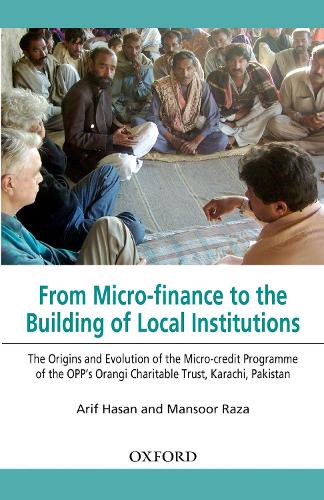
From Micro-Finance to the Building of Local Institutions: The Origins and Evolution of Micro-Credit Programme of the OPP's Orangi Charitable Trust, Karachi, Pakistan
Series: English
The Orangi Pilot Project (OPP) was established, by Akhtar Hameed Khan the renowned Pakistani social scientist, in the informal settlement of Orangi, Karachi, in 1980. The objective of the Project was to build models of participatory development that could overcome the problems faced by conventional development programmes in dealing with informal settlements and poverty related issues. Among other
NaN
VOLUME
English
Hardback

The Orangi Pilot Project (OPP) was established, by Akhtar Hameed Khan the renowned Pakistani social scientist, in the informal settlement of Orangi, Karachi, in 1980. The objective of the Project was to build models of participatory development that could overcome the problems faced by conventional development programmes in dealing with informal settlements and poverty related issues. Among other things the Project worked at establishing producer and consumer cooperatives. These attempts slowly evolved into a micro-credit programme, the first of its kind in Pakistan. Though it was originally limited to Orangi, it soon moved to supporting NGOs and CBOs through the OPP's Charitable Trust (OCT), in the rural and urban areas of Pakistan in operating their own micro-credit programmes whose clients are small farmers, businessmen and rural women. This support consist of providing training-by-doing to local people in account keeping, market research, credit appraisal, issues related to defaults, and health for creating client associations that involve themselves in development and socio-political related affairs of their areas. This book describes the evolution of the OCT programme, its current vision, unconventional methodology, the leadership of the OCT partners and the conditions that have produced it, and issues related to the programmes management and sustainability. The book also describes the impact of the programme on human resource development and women, and changes in power relations between producers and market operators, and between different classes in the areas where the programme is operative.About the Author: Arif Hasan is an architect/planner in private practice in Karachi. He has been a consultant and advisor to many local and foreign CBOs, national and international NGOs, and bilateral and multilateral donor agencies. Since 1981, he has been involved with the Orangi Pilot Project (OPP) as its Chief Consultant and currently as Chairman of its Research and Training Institute. He is also one of the founder members of the Urban Resource Centre (URC) Karachi, and its Chairman since its inception in 1989. Mansoor Raza has been a Deputy Director at the Usman Institute of Technology and is currently Deputy Director, Disaster Management for the Church World Service -Pakistan/Afghanistan. He has worked at the Church World Service since 2002. Prior to this he worked at the NGO Resource Centre Karachi as a Field Coordinator, building the capacity of community-based NGOs and designing training packages for grassroots organizations.
Price Comparison [India]
In This Series
Bestseller Manga
Trending NEWS




















